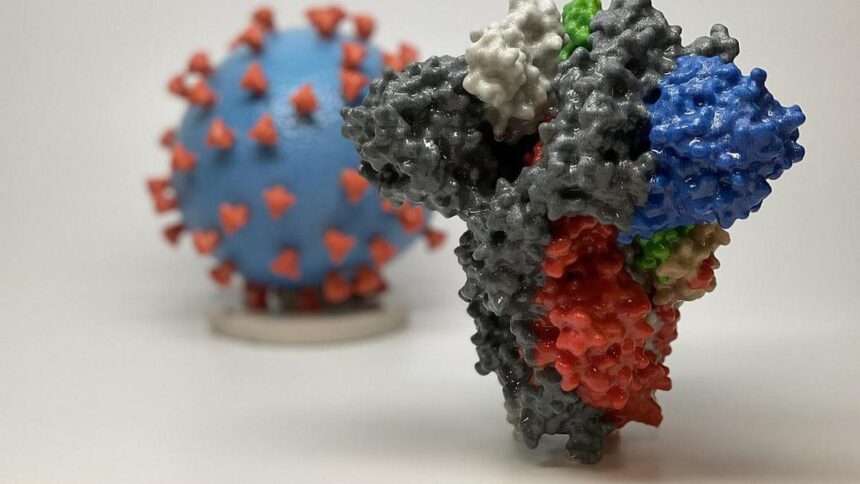In scientific circles, the SARS-CoV-2 virus is known as a vasculopathic agent: it damages blood vessels.
The predominant respiratory symptoms associated with COVID-19 are generally due to clotting and inflammation in the blood vessels of the lungs (rather than direct involvement of the airways). More severe complications, including neurological ones such as stroke, also occur in vasculopathy.
Lack of correlation
Persistent thrombo-inflammation is an important mechanism in the complex network of factors that lead to symptoms of the post-acute sequelae of SARS-CoV2 infection – aka long-term COVID. This condition continues to affect millions of people worldwide despite high population immunity and lower incidence of COVID-19.
This is why blood thinners play an important role in managing complications due to COVID-19. Unfortunately, the researchers found that these complications were not related to the severity of early COVID-19, meaning that people can develop these complications after a mild or asymptomatic COVID-19 infection.
A large knowledge gap exists regarding the mechanisms underlying blood clotting difficulties (coagulopathy), their consequences, and treatment options for inflammation and neuropathology.
Turned it on his head
A study published in nature on August 28 provided a new perspective on this scenario and has seeded the hope of the findings in managing this case.
The study concerns fibrinogen and fibrin, two blood components that play an important role in clotting. Fibrinogen is a soluble protein that is formed in the liver and then converted to insoluble fibrin.
When the body bleeds, the event triggers a carefully controlled process that ends with a clot. Uncontrolled or abnormal coagulation is the cause of coagulation-related complications in several clinical conditions, including COVID-19 and prolonged COVID.
The current concept of the pathogenesis of SARS-CoV-2 is that inflammation triggered by the virus damages the endothelium, or inner lining, of blood vessels. This causes the clotting process when fibrin is deposited in the blood. But new research has changed this concept. Using a mouse model of COVID-19, researchers have shown that fibrinogen and active fibrin bind to the spike protein of the SARS-CoV-2 virus and that this relationship causes inflammation and complications in the lungs and brain.
That is, rather than being part of the effect, fibrin is reported to be a driver of inflammation and neuropathology of COVID-19.
Spike protein-fibrin combo
The team gradually provided evidence to support their findings. For the first time, researchers have shown that trimeric spike protein binds to fibrinogen with significant affinity. They also showed spike proteins and fibrinogen to be localized in high concentrations in the lungs (during experimental infection with viruses).
The researchers also reported that a specific binding site, called γ377–395in fibrinogen where the spike protein attaches itself. (Conversely, there are several sites on the spike protein where fibrinogen can bind itself.37–103researchers identified as “the best”.)
Next, they showed that the interaction of the spike protein with fibrinogen, and fibrin, leads to a modified clot structure that cannot be broken down (lysis). This is consistent with the lower-than-usual effectiveness of frozen-dissolved drugs in people with COVID-19.
Furthermore, researchers have shown that abnormal clots can trigger inflammatory activity that worsens when fibrinogen is converted to fibrin. They also showed that the fibrin-spike protein combo alters immune pathways.
It has nothing to do with the vaccine issue
We know that protein spikes continue to circulate in the bodies of long-term COVID patients even after the active infection has cleared. So the researchers studied the role of the fibrin-spike protein combo in the post-infection scenario as well. Here, they report a fibrin-dependent mechanism that triggers an inflammatory response in the presence of spike proteins but even in the absence of active infection.
Importantly, researchers have said that this not mechanisms underlying rare clotting-related complications associated with adenovirus vector-based COVID-19 vaccines. These complications are related to the adenovirus component and have not been seen in vaccines based on other platforms that also use spike proteins.
Choice of monoclonal antibodies
The study is interesting because it points to a therapeutic strategy that may change the way we manage COVID-19 and prolonged COVID.
In fact, the researchers found that the 5B8 monoclonal antibody binds γ377–395 sites of fibrinogen and can prevent protein spikes and prevent all the resulting complications. These antibodies also do not alter the normal function of fibrinogen and do not cause clotting-related side effects.
They demonstrated this therapeutic strategy in a mouse model of COVID-19. An affinity derivative of 5B8 modified for human use has entered phase I clinical trials to assess safety and tolerability. If it successfully completes this phase, it will likely enter phase 2 where researchers will establish clinical endpoints.
Proceed with caution
That said, although the study appears to be a path-breaking advance, critics rightly point out that these are early animal studies and there is still a long way to go.
Furthermore, although the researchers repeatedly emphasized the importance of the study findings for the long-term management of COVID, the duration of the study was not long enough to qualify as a long-term study of COVID. per se. Most of the conclusions in these studies are based on hypotheses and extrapolations that need to be confirmed by more studies designed specifically for this purpose.
Finally, the researcher’s conflict of interest is important: many of the authors are associated with companies that make fibrin antibodies as well as patent holders for the development and use of antibody therapy.
Puneet Kumar is a doctor, Kumar Children’s Clinic, New Delhi. Vipin M. Vashishtha is director and paediatrician, Mangla Hospital and Research Centre, Bijnor.




